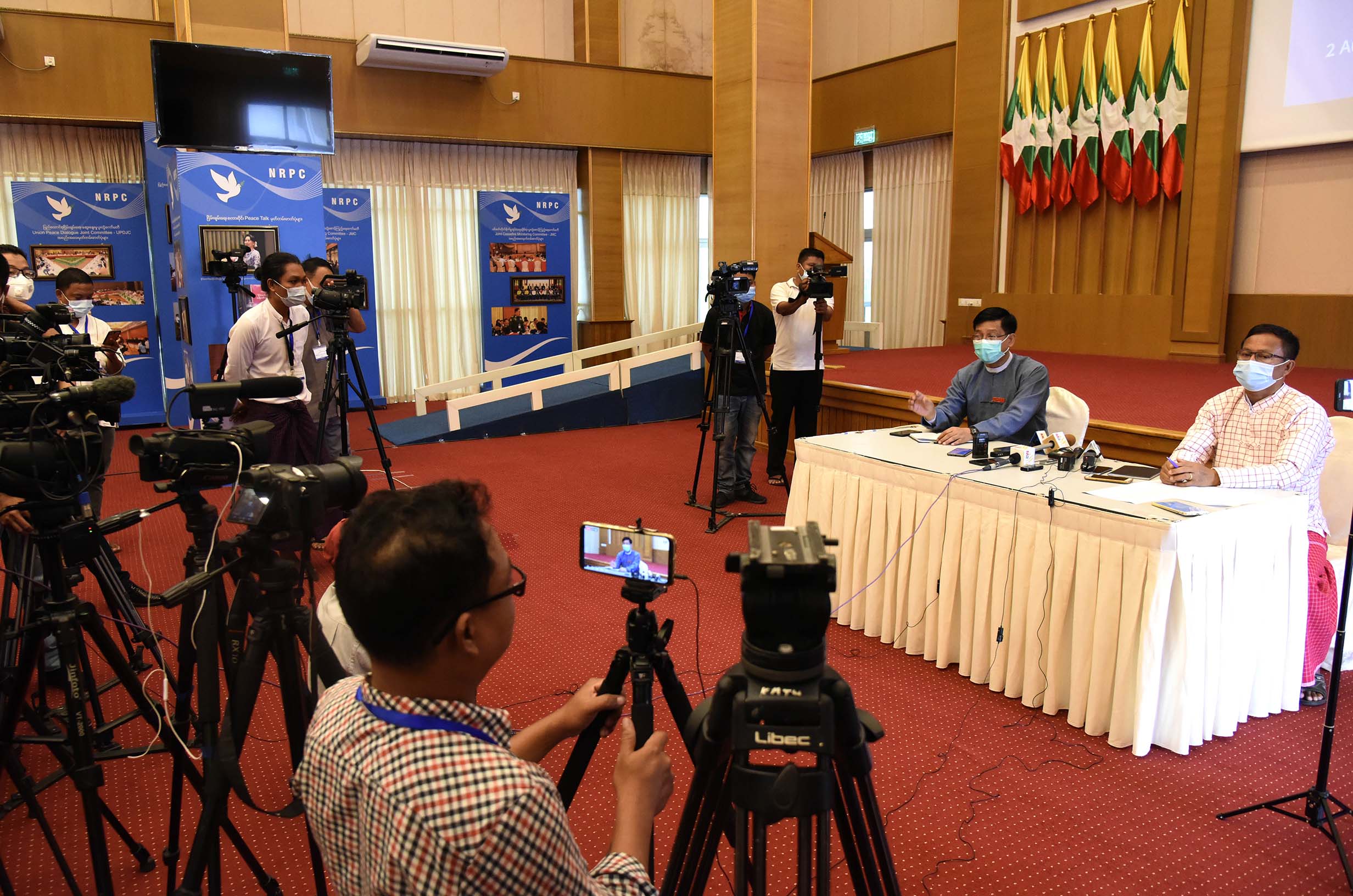THE two-day negotiation meeting of the Government and the NCA-S EAOs (Nationwide Ceasefire Agreement Signatories) Ethnic Armed Organizations successfully concluded on 2 August at the National Reconciliation and Peace Centre (NRPC) in Nay Pyi Taw.
After the second-day meeting on 2 August, Ministry of State Counsellor’s Office Director-General U Zaw Htay and NCA-S EAOs Representative Nai Aung Ma Ngay jointly held a press conference about the meeting.
During the press conference, Director-General U Zaw Htay said that the main discussion between the government and the NCA-Signatories Ethnic Armed Organizations is to hold a bilateral meeting on the 8th JICM decision number 1, and facts on Chapter 3 and 4 of the NCA, adding that the Joint Monitoring Committee (JMC) meetings will also be held in parallel.
After the JICM meeting, UPDJC meeting and JMC-U (Joint Monitoring Committee – Union Level) could be organized, but there was difficulty of holding JMC-S (Joint Monitoring Committee –State Level), but the matter was fruitfully discussed on the second-day meeting, he said.
NCA-S EAOs representative Nai Aung Ma Ngay said that they agree to hold the JMC-S (Joint Monitoring Committee –State Level) in the last week of September this year. The coordination meetings on holding the JICM meeting will be held on 4th and 5th August, and the JICM preliminary meeting will be held on 10 and 11 August, and the JICM meeting on 13 August.
Afterwards, Director-General U Zaw Htay responded to the questions raised by news media. “In November 2018, the RCSS issued a statement saying they withdrew from the JMC (Joint Monitoring Committee) meetings. In the same month, KNU announced its suspension from NCA meetings. It meant that they would not participate in the peace talks. So, we went back to the JICM meetings.”
The 8th JICM meeting was organized on 8 January, and both sides agreed on 8 decisions, according to U Zaw Htay.
He also explained about why Chapter 3 and 4 of the NCA should be discussed again. “The Chapter 3 of NCA is ‘Ceasefire Related Matters’. There are some tasks that troops of both sides have to do within 60 days. But some tasks could not be done because of various reasons,” he said.
He added, “According to the Chapter 3 of the NCA, designated areas have been set. And it says how to avoid fighting, how to ease military tensions in conflict areas, and how to communicate between leaders of both sides and lower level commanders. A Code of Conduct has been drawn up based on those facts. But in practice, some facts could not be implemented, and problem occurred. So, there are some points that should be discussed again.”
Director-General U Zaw Htay also highlighted that both sides have agreed on how the JMC-S meetings will be held and the schedule of those meetings.
He said that both sides will have to negotiate for frameworks to implement the NCA; processes for post-2020 period, and the matters related to the Union Accord will also be discussed.
He also emphasized that the government will exert efforts in order that NCA non-signatories can also participate in the peace process.
Regarding how the COVID-19 crisis affected the peace process, he said, “In the past, we agreed that the fourth session of the Union Peace Conference would be organized within the first quarter of 2020. But the COVID-19 pandemic gained momentum in January, February and March, so the frequency of discussions decreased. But during that period, we made online discussions. The agreements reached on those online discussions are also reviewed in this meeting.”
The Director-General added that the two-day meeting was fruitful and very important for the upcoming Union Peace Conference 21st century Panglong.
He also informed that there will be meetings between the Tatmadaw and RCSS; and between the Tatmadaw and KNU to discuss the matters related to designated areas and movements of troops.
In response to the request, the National Reconciliation and Peace Centre (NRPC) asked for the list of those families, and then financial assistance was provided to those families, according to the Ministry of State Counsellor’s Office Director-General U Zaw Htay.
Myo Myint, Han Lin Naing
(Translated by Maung Maung Swe)
Photo: Ko Htein
#The_Global_New_Light_of_Myanmar

